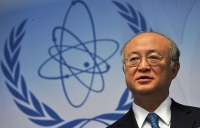IAEA reports Syria over undeclared reactor
10 June 2011
The International Atomic Energy Agency (IAEA) has decided to report Syria to the United Nations Security Council and General Assembly over non-compliance with its nuclear safeguards obligations by failing to declare the construction of a nuclear reactor.
 |
| IAEA director general Yukiya Amano addresses the June 2011 board (Image: D Calma/IAEA) |
The IAEA's board of governors reached their decision to report Syria to the UN in a resolution adopted during a five-day meeting in Vienna. Syria claims that an installation at Dair Alzour, destroyed by an air strike in September 2007, was a military non-nuclear installation and not a clandestine nuclear reactor site. However, as the IAEA resolution notes, the country has not supplied documentation to support its claims and has not allowed the agency to confirm its assertions about the non-nuclear nature of the destroyed building.
Significant numbers of particles of anthropogenic natural uranium – that is, uranium produced by chemical processing – were discovered at the site, although Syria asserted that this originated from the ordnance used to destroy the facility. Furthermore, the agency notes with "serious concern" Syria's lack of cooperation with repeated requests for additional information and its refusal to engage "substantively" with the IAEA since it visited the Dair Alzour site in June 2008.
On considering all the information available, the IAEA says that the destroyed building "was very likely" a nuclear reactor. "The Syrian Government was given ample time by the Agency to cooperate fully concerning the Dair Alzour site, but did not do so. Nevertheless, we had obtained enough information to draw a conclusion," IAEA director general Yukiya Amano said at the opening of the IAEA board of governors meeting on 6 June.
According to the IAEA, the discovery of the anthropogenic natural uranium particles, together with other considerations including the history of concealment of Syria's nuclear activities and procurement activities, have resulted in a lack of confidence that Syria's nuclear program is exclusively for peaceful purposes. This has in turn given rise to concerns regarding the maintenance of international peace and security, the agency says.
As a signatory to the Nuclear Non-Proliferation Treaty (NPT) Syria has a safeguards agreement which requires it both to declare any nuclear activities to the IAEA and to provide design information on nuclear facilities. However, the country is not among the 139 signatories of safeguards-strengthening Additional Protocols that give the IAEA rights to considerably more information and greater rights of access. The IAEA has called on Syria to sign and fully implement an Additional Protocol as soon as possible as well as urgently remedying its non-compliance with its existing safeguards agreement.
Attack 'deeply regrettable'
The IAEA, both in its resolution and in Amano's opening comments, has condemned the destruction of the Dair Alzour facility before the agency had a chance to establish the facts in accordance with its own responsibilities under Syria's safeguards agreement.
"It is deeply regrettable that the facility was destroyed - allegedly by Israel - without the Agency having been given an opportunity to perform its verification role. Rather than force being used, the case should have been reported to the IAEA," Amano said at the outset of the meeting.
Researched and written
by World Nuclear News